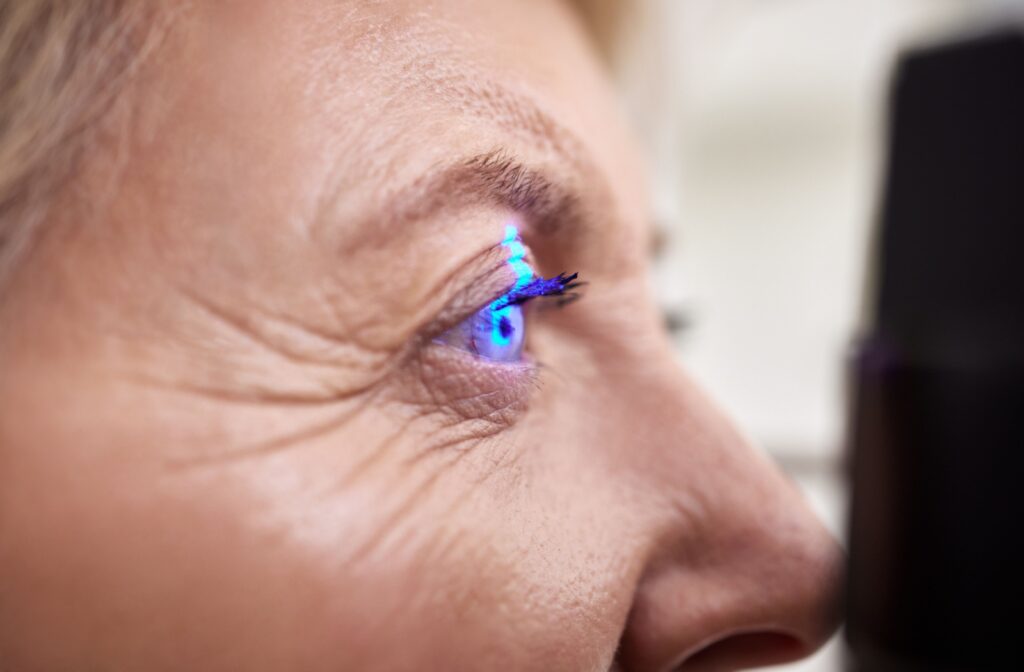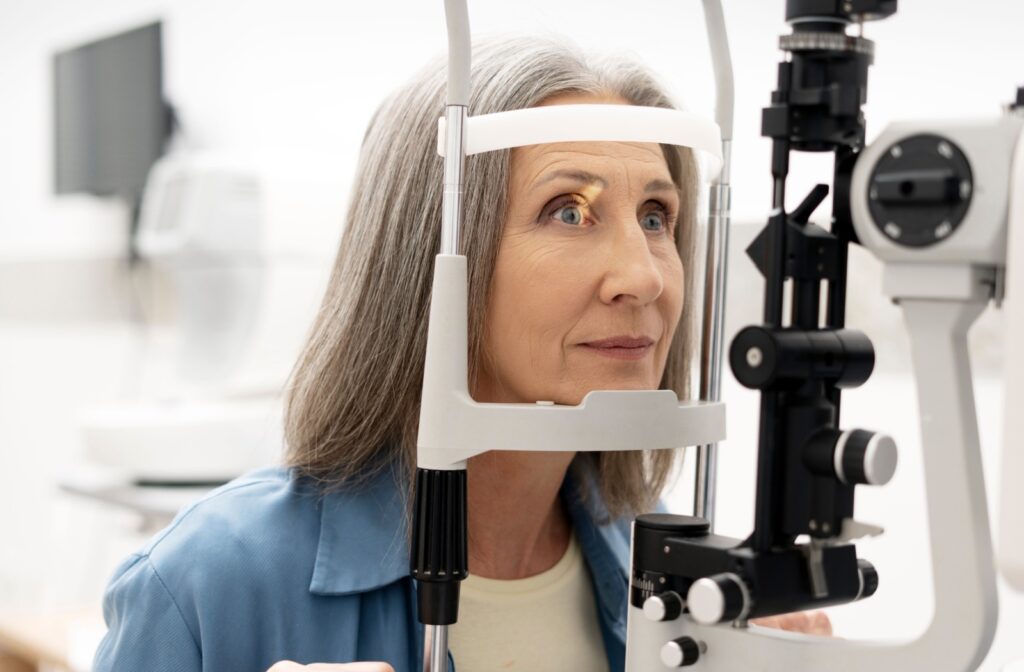Protecting your vision gets more important with age, and sometimes, the earliest signs of change aren’t noticeable right away. That’s why regular eye exams are about more than just updating your prescription. They’re a proactive way to stay ahead of serious eye conditions that can affect your independence and quality of life.
One of the most common age-related vision concerns is macular degeneration, a condition that impacts your central vision over time. Your optometrist is trained to detect and manage macular degeneration using innovative tools and techniques, often before you notice any symptoms.
Early detection is your defence.
The Importance of Routine Eye Exams
Routine eye exams are essential, especially as we get older, for detecting changes in the eyes that may signal macular degeneration or other issues. These visits go beyond checking your vision. They give your optometrist a full picture of your ocular health.
An annual exam can help catch the earliest signs of macular degeneration, allowing for timely care and proactive management. Your optometrist will recommend an exam schedule based on your age, risk factors, and any symptoms you may be experiencing.
Understanding the Risks of Macular Degeneration
Macular degeneration is an eye disease that affects the macula, a small area at the back of your eye in the center of the retina responsible for sharp, central vision. This condition can make everyday tasks like reading or recognizing faces more difficult. It’s most often age-related and is commonly referred to as age-related macular degeneration (AMD).
There are 2 main types of AMD:
- Dry AMD is more common and causes a gradual loss of central vision over time.
- Wet AMD is less common but more severe. It occurs when abnormal blood vessels grow under the retina, leading to faster and more pronounced vision loss.
AMD doesn’t typically cause complete blindness, but it can significantly affect your ability to see clearly. Fortunately, early detection and ongoing management can help slow its progression. That’s why regular comprehensive eye exams are essential, even if you haven’t noticed any changes in your vision.
Recognizing Early Symptoms
Noticing the early signs of macular degeneration can make all the difference when it comes to protecting your sight. Some of the most common symptoms include:
- Blurred or distorted vision
- Trouble recognizing faces
- Needing extra light for reading
- Straight lines that appear wavy or bent
If you’ve noticed any of these changes in your vision, we recommend booking a comprehensive eye exam.
How Optometrists Can Help
Optometrists are highly trained healthcare professionals who specialize in caring for your vision and overall eye health. They perform comprehensive eye exams, prescribe glasses or contact lenses, and screen for a wide range of eye conditions, including macular degeneration.
During a routine eye exam, your optometrist will look for early signs of macular degeneration using diagnostic tools like visual acuity testing and retinal imaging. Catching these signs early allows for proactive care and helps protect your long-term vision.
Many people don’t realize how vital optometrists are in detecting eye diseases. In most cases, they’re the first to identify changes that may point to more serious concerns.
Partnering with Ophthalmologists
Sometimes, your optometrist may refer you to an ophthalmologist, especially if your age-related macular degeneration (AMD) requires specialized treatment. Ophthalmologists are medical doctors who specialize in eye and vision care and are trained to perform surgeries when necessary.
Even after a referral, your optometrist continues to manage your routine eye care and monitor changes in your vision. The ophthalmologist focuses on advanced treatment, such as injections or surgical procedures.
In some cases, laser eye surgery may be recommended to help manage wet AMD. While optometrists don’t perform surgery, they play a key role in identifying when it’s needed and coordinating your care with the appropriate specialist.

Diagnostic Tools & Techniques
Optometrists use a range of tools to help detect macular degeneration early. One common method is the Amsler grid test, which can reveal changes in your central vision. If the lines appear wavy, broken, or blurry, it may indicate macular changes.
For a more detailed view, optical coherence tomography (OCT) is a noninvasive imaging tool that captures high-resolution cross-sections of the retina. This innovative technology allows your optometrist to see subtle changes in the macula and helps diagnose both dry and wet forms of AMD.
Treatment Options for Macular Degeneration
For dry AMD, your optometrist may recommend lifestyle changes that support eye health, such as eating more leafy greens, staying active, and quitting smoking. These small steps can make a big difference over time.
When it comes to wet AMD, your optometrist may refer you to an ophthalmologist for treatments like injections or laser therapy. While they don’t perform these procedures, your optometrist plays a crucial role in ongoing monitoring and care, helping coordinate treatment and keeping a close eye on your vision between specialist visits.
Protecting Your Visual Health Starts Here
Macular degeneration can develop gradually. With early diagnosis and proactive care, you can protect your vision and maintain your daily lifestyle with confidence. Whether you’ve noticed changes in your sight or simply haven’t had an exam in a while, now is the time to take action.
Your optometrist is here to support every step of your eye health journey. Book your next appointment with Griffin Optometric Group – Talega today because your vision deserves care and personal attention, right here in your community.



